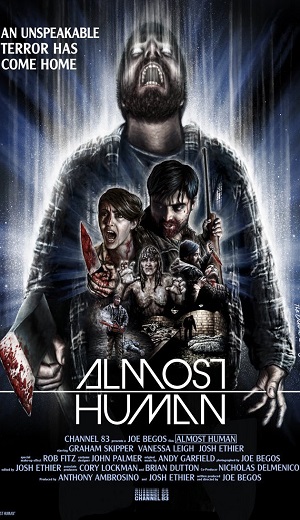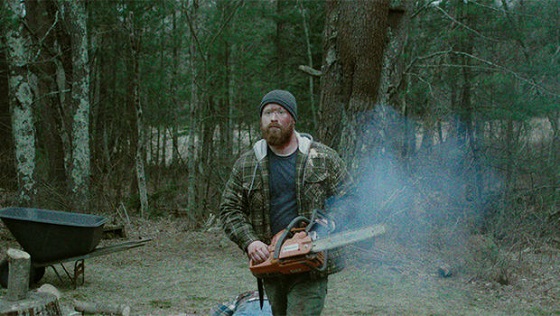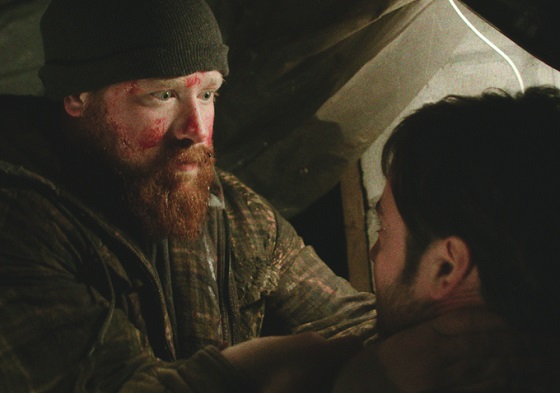 A well-intentioned 80’s-style slasher flick with gore and action to spare, Almost Human is never quite able to rise above the amateur-hour filmmaking traps in which first-time director Joe Begos repeatedly finds himself. To make matters worse, the film is so deeply anchored in a series of referential homage sequences that it’s robbed of any originality or exciting vitality. Sadly, all that remains is a badly acted alien abduction movie with a handful of fun, bloody moments, yet little else.
A well-intentioned 80’s-style slasher flick with gore and action to spare, Almost Human is never quite able to rise above the amateur-hour filmmaking traps in which first-time director Joe Begos repeatedly finds himself. To make matters worse, the film is so deeply anchored in a series of referential homage sequences that it’s robbed of any originality or exciting vitality. Sadly, all that remains is a badly acted alien abduction movie with a handful of fun, bloody moments, yet little else.
The plot of Almost Human is simple enough. It begins with a distraught man pulling up to the house of some friends, which he rushes into in a terrified panic. This man, Seth (Graham Skipper), tries to warn his friends Mark and Jen (Josh Ethier and Venessa Leigh) about a blue light that attacked his car on the way over there, and sucked their mutual friend who had been riding with him up and into the sky. As bad as this seems for everyone, things go downhill from there, as Mark is sucked into the sky by the very same blue light whilst Seth and Jen look on in horror. The film then jumps ahead two years and lands on Seth, who seems to have initially been blamed by authorities for the disappearances, yet was eventually let go for lack of evidence.
The audience learns that Jen has moved on and is engaged to another person, and that Seth has never really gotten over the event and Mark’s disappearance (their other friend, the one originally sucked out of Seth’s car, is curiously omitted from their reflections on the night in question). When the audience finds him again two years later, Seth has been having strange dreams about Mark coming back from wherever, and as the movie progresses into its second act, these dreams appear to be more and more prophetic.
At its core, the film is tolerable enough. It’s a throwback to 1980’s slasher pics with an element of sci-fi thrown in for a little extra flavor. Begos certainly isn’t afraid to spill some blood, and seems to have made an earnest effort to entertain his audience with some exciting, fun murders (and in these moments, he did a fine job). The effects are practical, and are a refreshing reminder of the buckets-of-blood style of filmmaking that set directors like Sam Raimi and John Carpenter apart from the pack thirty-plus years ago. Yet this reverence to the ghosts of horror movie-past also shackles Almost Human, and keeps it from rising out of the dregs of so many B-movie imitators.
Almost Human has components of It, The Fly, Fire in the Sky, The Shining, The Thing, The Invasion of the Body Snatchers, and The Evil Dead not simply peppered or sprinkled throughout, but acting as the core foundation of the entire movie (especially its second half). Entire sequences are pulled from the aforementioned horror classics, which is all aside from the fact that Almost Human is just a half-assed reimagining of The Invasion of the Body Snatchers (and to a lesser extent, John Carpenter’s The Thing).
And really, that’s the problem. A person could give a first-time filmmaker a pass on lousy acting, jagged editing, stilted dialogue, questionable camera choices, and even curious tonal shifts (and all of these issues are at play in Almost Human) if the story was at least original, and something altogether new. This simply isn’t the case with Begos’ picture, however, as the director/writer/producer/cinematographer never really brought his movie out of homage territory, and into its own original place. As just mentioned, Begos wore a number of different hats on this project, and one can’t help but to wonder how the film might have turned out if the script had gone through a re-write via a different set of eyes, and/or the actors weren’t getting their direction from somebody already occupied with planning and setting up all the shots.
A decent enough first effort that had its heart in the right place (if not its head), Almost Human isn’t something a person would be likely to recommend, yet if nothing else, it showed a sparkle of promise for a director who is at least working with a few decent instincts.







Comments on this entry are closed.